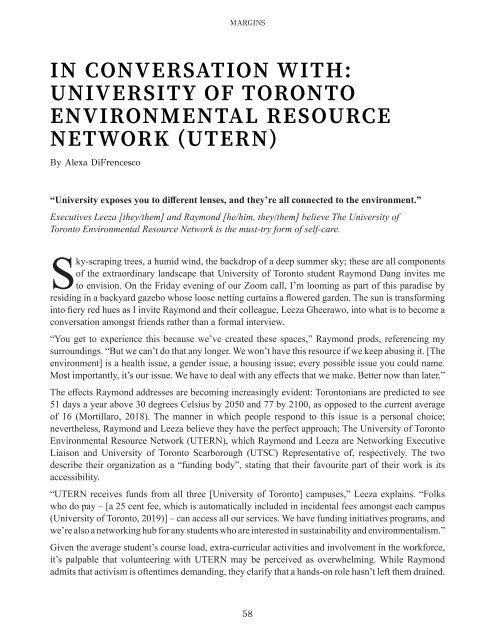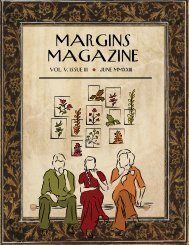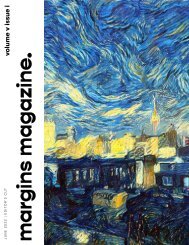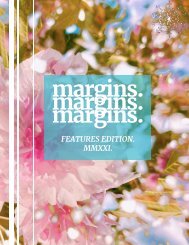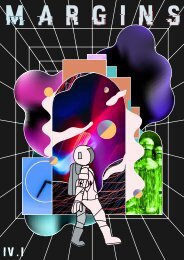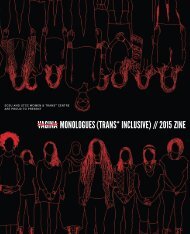Margins Magazine - Volume 3 Issue 1
2020 has been a year of immense change and upheaval thus far, with our idea around what is normal challenged in the midst of a pandemic. In this midst of these volatile times, our team at Margins Magazine has come together to create Volume 3 Issue 1 of our publication, revolving around the theme of CHANGE. In this issue, our writers have worked hard to bring you pieces that critically discuss the realities of the current moment from advocacy effort across different fields to issues such as domestic violence and colourist. At #UTSC, we connect with Radio FWD and UTERN at UTSC to learn how campus groups are affected during the pandemic and how they are evolving their programming while staying connected with students. We’ve received amazing creative submissions from members of our local community and around the world that have allowed us to curate this issue with stories that truly represent the heart, soul, and pulse of the current times. Bringing together all these voices in Margins has been a true labour of love. We truly hope that the stories, words, and art within Margins resonate with you. Follow us on Instagram @wtcmargins & LinkedIn https://www.linkedin.com/company/margins-magazine!
2020 has been a year of immense change and upheaval thus far, with our idea around what is normal challenged in the midst of a pandemic. In this midst of these volatile times, our team at Margins Magazine has come together to create Volume 3 Issue 1 of our publication, revolving around the theme of CHANGE.
In this issue, our writers have worked hard to bring you pieces that critically discuss the realities of the current moment from advocacy effort across different fields to issues such as domestic violence and colourist. At #UTSC, we connect with Radio FWD and UTERN at UTSC to learn how campus groups are affected during the pandemic and how they are evolving their programming while staying connected with students.
We’ve received amazing creative submissions from members of our local community and around the world that have allowed us to curate this issue with stories that truly represent the heart, soul, and pulse of the current times.
Bringing together all these voices in Margins has been a true labour of love. We truly hope that the stories, words, and art within Margins resonate with you.
Follow us on Instagram @wtcmargins & LinkedIn https://www.linkedin.com/company/margins-magazine!
You also want an ePaper? Increase the reach of your titles
YUMPU automatically turns print PDFs into web optimized ePapers that Google loves.
MARGINS<br />
MARGINS<br />
IN CONVERSATION WITH:<br />
UNIVERSITY OF TORONTO<br />
ENVIRONMENTAL RESOURCE<br />
NETWORK (UTERN)<br />
By Alexa DiFrencesco<br />
“University exposes you to different lenses, and they’re all connected to the environment.”<br />
Executives Leeza [they/them] and Raymond [he/him, they/them] believe The University of<br />
Toronto Environmental Resource Network is the must-try form of self-care.<br />
Sky-scraping trees, a humid wind, the backdrop of a deep summer sky; these are all components<br />
of the extraordinary landscape that University of Toronto student Raymond Dang invites me<br />
to envision. On the Friday evening of our Zoom call, I’m looming as part of this paradise by<br />
residing in a backyard gazebo whose loose netting curtains a flowered garden. The sun is transforming<br />
into fiery red hues as I invite Raymond and their colleague, Leeza Gheerawo, into what is to become a<br />
conversation amongst friends rather than a formal interview.<br />
“You get to experience this because we’ve created these spaces,” Raymond prods, referencing my<br />
surroundings. “But we can’t do that any longer. We won’t have this resource if we keep abusing it. [The<br />
environment] is a health issue, a gender issue, a housing issue; every possible issue you could name.<br />
Most importantly, it’s our issue. We have to deal with any effects that we make. Better now than later.”<br />
The effects Raymond addresses are becoming increasingly evident: Torontonians are predicted to see<br />
51 days a year above 30 degrees Celsius by 2050 and 77 by 2100, as opposed to the current average<br />
of 16 (Mortillaro, 2018). The manner in which people respond to this issue is a personal choice;<br />
nevertheless, Raymond and Leeza believe they have the perfect approach; The University of Toronto<br />
Environmental Resource Network (UTERN), which Raymond and Leeza are Networking Executive<br />
Liaison and University of Toronto Scarborough (UTSC) Representative of, respectively. The two<br />
describe their organization as a “funding body”, stating that their favourite part of their work is its<br />
accessibility.<br />
“UTERN receives funds from all three [University of Toronto] campuses,” Leeza explains. “Folks<br />
who do pay – [a 25 cent fee, which is automatically included in incidental fees amongst each campus<br />
(University of Toronto, 2019)] – can access all our services. We have funding initiatives programs, and<br />
we’re also a networking hub for any students who are interested in sustainability and environmentalism.”<br />
Given the average student’s course load, extra-curricular activities and involvement in the workforce,<br />
it’s palpable that volunteering with UTERN may be perceived as overwhelming. While Raymond<br />
admits that activism is oftentimes demanding, they clarify that a hands-on role hasn’t left them drained.<br />
58 59


